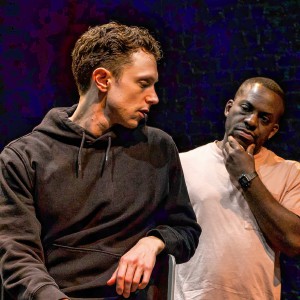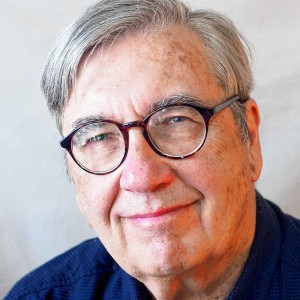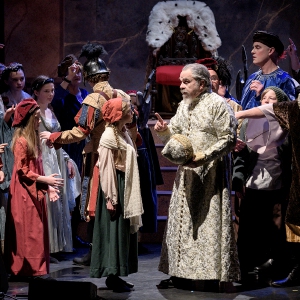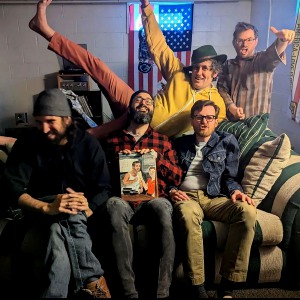Artists showcase growth in the Upper Valley’s music infrastructure, but live venues still lacking
| Published: 04-10-2023 10:05 AM |
James Graham first picked up a guitar at 14 and has played music ever since. Writing songs gives voice to his inner life.
“I think (for) most people (who) come to the singer-songwriter thing is, it’s a refuge when you’re a kid,” Graham said in a recent interview.
In the long run, though, if music is to become more than a sanctuary, it has to be played live. And it helps to make recordings, too, if only as a calling card to send to potential venues.
Graham, who moved to Lyme with his wife and son in 2004, has played gigs sporadically over the years, as work and child-rearing permitted. Now, at 60, he has put out his first record.
“I was like, ‘Well, if you’re ever going to make a recording, you’re going to have to do it. You can’t just dream about it,’ ” Graham said.
Graham picked a propitious moment to capture some of his songs. After the coronavirus pandemic shut down music venues, the Upper Valley appears to be steadily building up the capacity to support musicians.
Two new recording studios have opened in recent years: The Underground, in Randolph, and The Station, in Norwich. Bands emerging with new recordings from those studios are holding their record release parties at Sawtooth Kitchen, a new venue in Hanover designed around its stage, and The Underground also hosts a listening room.
These developments have given musicians and music fans alike a little hope that the Upper Valley might eventually foster a scene that brings musicians and audiences together in a range of appealing venues to hear original, locally written and produced songs.
Article continues after...
Yesterday's Most Read Articles
 Football helmet maker buys Lebanon’s Simbex
Football helmet maker buys Lebanon’s Simbex
 James Parker granted parole for his role in Dartmouth professors’ stabbing deaths
James Parker granted parole for his role in Dartmouth professors’ stabbing deaths
 Zantop daughter: ‘I wish James' family the best and hope that they are able to heal’
Zantop daughter: ‘I wish James' family the best and hope that they are able to heal’
 Kenyon: Dartmouth alumni join union-busting effort
Kenyon: Dartmouth alumni join union-busting effort
 Parker up for parole more than 2 decades after Dartmouth professor stabbing deaths
Parker up for parole more than 2 decades after Dartmouth professor stabbing deaths
 Through new school partnerships, CRREL seeks to educate young scientists
Through new school partnerships, CRREL seeks to educate young scientists
“If you want to have a sustainable career as a musician, you need to play live shows,” Stevens Blanchard, frontman for The Conniption Fits and a longtime observer of the local music ecology, said in an interview. “In the Upper Valley, that’s always been the bottleneck.”
Though recording technology is much cheaper and more accessible than it used to be, having a professional engineer to oversee the process can be invaluable, Blanchard said. “It’s a different part of your brain,” from writing songs and practicing an instrument.
Graham recorded his seven-song album, “Every Day Is You,” at The Underground, which his friend John Foster, a drummer, told him about. The record is credited to James Graham & Co.
The Station, a recording studio set up in an outbuilding by the musicians Seth Barbiero and Lisa Piccirillo and operated by Los Angeles-based musician and audio engineer Matt Appleton, provided a recording home for Shy Husky, an alt-rock band that recently released a three-song EP.
Alison Turner, a Royalton-based singer-songwriter who performs as Ali T, recently released a new album of pop songs, “Pancakes at Midnight,” that she recorded on her own. But a previous recording, “The Makeover,” was remixed by Vincent Freeman at The Underground.
After college, Graham was playing music in New York City, where he was part of the anti-folk scene in the late 1980s and early ’90s that both Michelle Shocked and Beck passed through. The movement was a response to the self-seriousness of the downtown folk music clique.
“It was so exciting to be part of a scene and to be writing songs and getting that group encouragement that it just sort of put wind in my sails,” Graham said.
Though he studied audio engineering for a while, Graham never got around to making a record himself. The cost of studio time seemed too steep, and a bit fraught. A live performance is momentary, but a recording is forever, so it has to be right. He made recordings at home, “but I was never able to complete something.” Perfectionism got in the way.
Contacting The Underground did the trick. Freeman, who has been recording music for 10 years and running the Randolph studio since 2019, put Graham in touch with musicians he needed to get the record made. Titian Tolbert sat in on drums and Alex Kelly played keyboard and trumpet. Other players were from Graham’s own contacts.
To accommodate the schedules of multiple players, they laid down tracks separately for Freeman to edit and mix.
“The record is funny,” Graham said. “It became something other than what I imagined, but I’m really happy with it. It definitely makes me want to do another one.”
As Freeman describes it, The Underground occupies a kind of in-between space in the recording business, connected and professional, but still small, nimble and inexpensive enough to be a viable option for someone like Graham, who paid out of his own pocket. The digital tools of the recording industry are more accessible than ever.
“I’m surprised and really happy that I have so many people reaching out to me,” said Freeman, who grew up mostly in Germany, but has family in Central Vermont. “I have probably comparatively small overhead. In the end, it’s probably more affordable” than a larger studio.
The members of Shy Husky — guitarist and lead vocalist Spencer Bladyka, guitarist Leo Charuhas, drummer Hayden Dow and bassist Jeff Meyer-Lorentson — had a recording experience similar to Graham’s. They’ve been playing together for seven or eight years and writing their own material, but it took an audio engineer and a studio to make a record happen.
“The added mental effort of trying to perform and trying to run the software,” Meyer-Lorentson said, “... it’s a ton of work.” He called Matt Appleton “an absolute wizard.”
The Station came to life after Seth Barbiero renovated an old barn on the property he and Piccirillo live on with their young son. Appleton is a friend from Piccirillo’s Skidmore College days and a member of the California ska-punk band Reel Big Fish.
“Right before the pandemic, he said he was moving back east and needed a place to put all of his studio gear,” Piccirillo said. He moved into the Norwich studio just before the pandemic restrictions went into effect in March 2020. “He’s brilliant and he’s done a lot of work for a lot of people,” Piccirillo said.
Piccirillo is in the process of making a record of her own, working at The Station with Burlington-based producer Jeremy Mendicino. Most of the recording for “Radiate” is done, and mixing and mastering is underway. The trick will be to find an audience.
Original pop and rock music has proliferated in the Upper Valley over the past 10 to 15 years. What Doth Life, the Windsor-based music collective, has put out dozens of albums of original work by multiple bands, including The Pilgrims, who celebrated their 10th birthday at Sawtooth Kitchen last weekend; Carton; Derek and the Demons; and Giant Travel Avant Garde, among others. Shy Husky, Ali T, James Graham, Lisa Piccirillo, Stevens Blanchard and many others are out there making original music. But they aren’t always easy to find. There’s a missing middle ground between obscurity and fame, a kind of local celebration of original music.
“What we’re struggling with, I think, as musicians, is how to reach people,” Piccirillo said. “There’s a shortage of listening rooms in the area.”
Jakob Breitbach hosts both a Wednesday evening acoustic jam at the Filling Station in White River Junction and Tuesday Jukebox, a weekly show featuring local musicians or acts that might be passing through, at Sawtooth Kitchen.
Last Tuesday, the house was close to full for a performance by the young singer Grace Wallace, backed by Route Five Jive, comprising Breitbach on fiddle and bass and guitarists Kit Creeger and Christopher Billiau.
This Tuesday, Breitbach presents a trio of Vermont singer-songwriters in the round, Ali T, Breanna Elaine and Dylan Patrick Ward. The show will be both live and livestreamed, part concert and part interview.
“My answer is to sort of meet the audience where they are,” Breitbach said in an interview. If that’s on social media, and audience members need to be lured back out to a music club, so be it. But, he added, “there just aren’t enough rooms.”
Local musicians have high hopes for Sawtooth. It falls into the sweet spot between small venues where an act can reach 25 people, such as Hartland’s Skunk Hollow Tavern, and big venues that local bands can’t fill, such as Lebanon Opera House, or even Briggs Opera House, which has 240 seats. A listening room seats between 50 and 150, enough patrons that a musical act stands to make a few bucks.
“I think Sawtooth is going to be important,” Piccirillo said.
Hanover native Kieran Campion started Sawtooth to fill what he called “a gaping void” in his hometown.
“It’s a college town without any real nightlife to speak of,” he said of Hanover.
New Hampshire requires establishments that serve alcohol to make half of their revenue from food, he noted, so bars, a music venue staple, are nonexistent.
Listening rooms were once more plentiful. The Engine Room, in White River Junction, shut down when the pandemic hit and hasn’t reopened. The Salt hill Pubs in West Lebanon and Hanover, which had live music several nights a week, also closed.
“The landscape has not returned to pre-pandemic levels,” Blanchard said. “I just don’t know if it will.”
But in addition to Sawtooth there are other signs of life. The Anonymous Coffeehouse, in Lebanon’s First Congregational Church, provides opportunities, but mainly for folk and Americana acts. Graham will play an acoustic set there on April 14 with another singer-songwriter, Jenny Voelkel. The Main Street Museum remains a viable option for bands seeking an audience.
And in Randolph, Freeman opened a listening room at The Underground last summer. It has a capacity of 49, which “I’ve found is kind of a perfect number,” Freeman said.
What a listening room enables is the performance of original songs. To fill a big hall, many musicians form cover bands.
Blanchard said his band, The Conniption Fits have “six all-original albums out, and when we play a show we play exactly none of it.” But they’ve built a name and a following as an adept party band that draws more than 300 people to its annual Masquerade Ball. Piccirillo, Barbiero, Bladyka and Meyer-Lorentson are all members of The Tricksters, a cover band that plays wedding and party gigs all over New England and New York.
They all love the cover band work, but they want to put their own songs in front of audiences.
Other art forms in the Upper Valley have the backing of sizable nonprofit groups: Opera North, Northern Stage, AVA Gallery and Art Center, ArtisTree Community Arts Center, to name a few. Playing in a band that writes its own songs is an outlier.
In the meantime, performers are working away and trying to reach the Upper Valley’s ears. Blanchard plays an hour of local music every Wednesday from 5 to 6 p.m. as part of his gig at The River 93.9, a West Lebanon-based FM station. Shy Husky was a recent studio guest. They and Ali T will join forces for a record release party at Sawtooth on April 15. And Graham and his band will do the same on May 6.
Graham would like his record to bring him a few more gigs and more listeners. He made the record with radio play in mind, with songs around four minutes long.
“I would certainly like to, if somebody heard it and said, ‘Would you come on tour with us?’ ” Graham said. “I’d have to go to my wife and say, ‘Hey, I’ve got to do this.’ ”
Alex Hanson can be reached at ahanson@vnews.com or 603-727-3207.

 Art Notes: After losing primary venues, JAG Productions persists
Art Notes: After losing primary venues, JAG Productions persists  Over Easy: Marvels in the heavens, and in the yard
Over Easy: Marvels in the heavens, and in the yard  Amid financial difficulties, Lebanon-based Revels North cancels midwinter show
Amid financial difficulties, Lebanon-based Revels North cancels midwinter show  Art Notes: The Pilgrims to perform ‘last’ show Saturday in Hanover
Art Notes: The Pilgrims to perform ‘last’ show Saturday in Hanover
